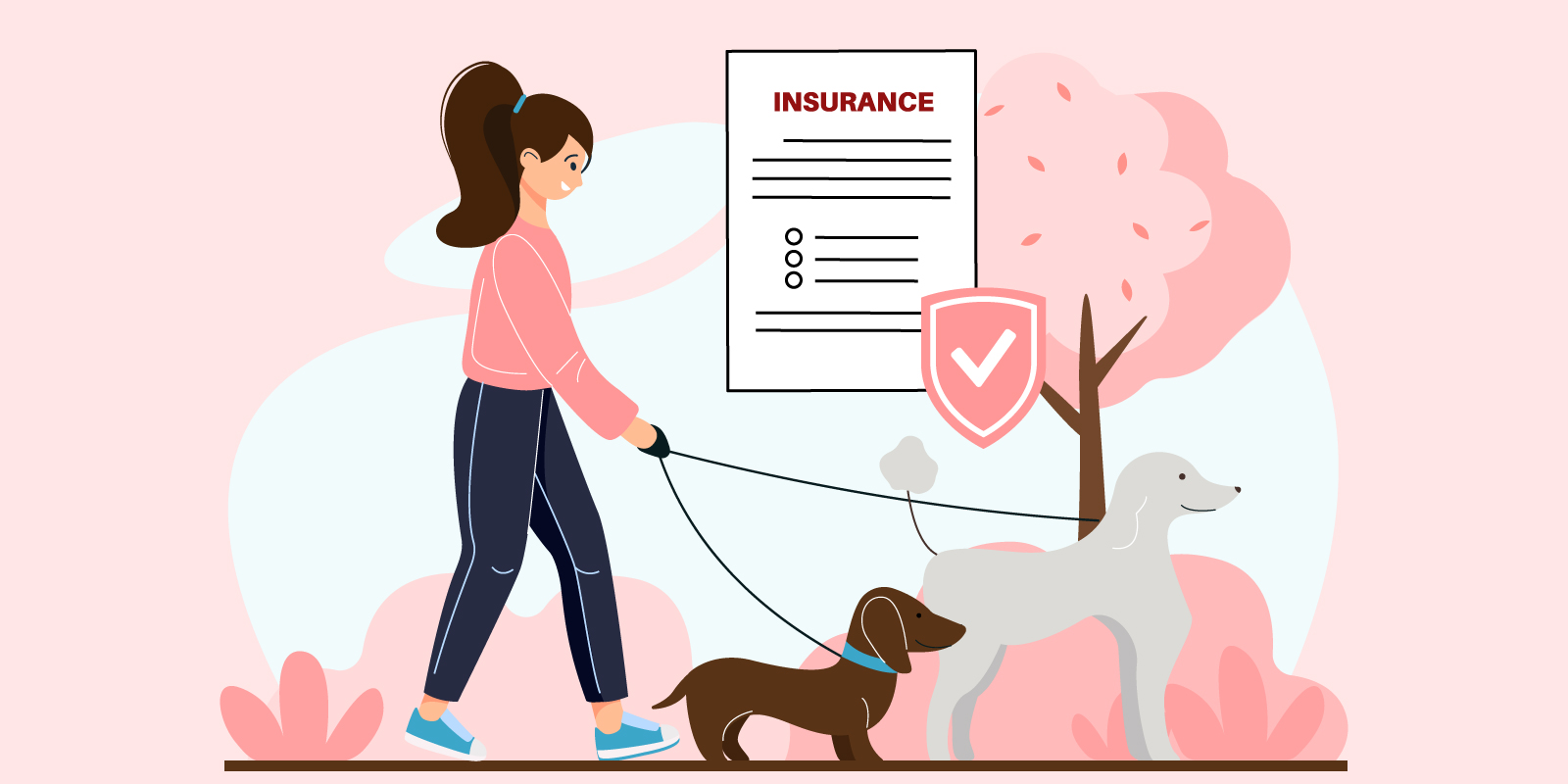It seems like there’s insurance for everything these days. You’ve got your auto policy, home or renters insurance, boat insurance, life insurance and health insurance.
We get it if you’re feeling tapped out of the insurance world, but a trending new type of insurance policy has proven to be very helpful—a pet insurance policy.
What exactly is a pet insurance policy? What does it cover? And is it really worth it? We’re going to take you through the ins and outs of a pet policy to help you decide if this is a good option for your four-legged friend.
What Is Pet Insurance?
Pet insurance is sort of like a pet health insurance policy. When your cat or dog has to see the vet, your pet insurance policy will help offset some of the costs. Also, like a traditional health policy, you will have to pay a deductible, your portion of the bill, before the insurance company gets billed.
How Did Pet Insurance Get Started?
The first pet insurance policy was in Sweden in 1890. Claes Virgin founded Länsförsäkrings, an insurance company that focused primarily on horses and other livestock. By 1947, pet insurance went to Britain, and by 1982, it was offered in America to the TV star Lassie.
Surprisingly, while Americans love to dote on their pets, as of 2021, only 1.3 percent of dogs and 0.23 percent of cats were covered by a pet insurance policy. In the UK, that number rises to 25%, and in Sweden, nearly 50% of pets were covered.
What Does Pet Insurance Cover?
Pet insurance policies are broken down into a few categories—accident policies, accident and illness policies, and wellness policies. It’s important to know that wellness policies don’t cover accidents or illnesses, and you won’t find any illness-only policies.
Accident-Only Policies
Much like they sound, accident-only policies are tailored specifically to provide financial help if your pet is involved in an accident. These policies don’t cover costs associated with illnesses such as cancer, UTIs or diabetes.
Instead, these policies kick in when your pet has had a sudden, unexpected injury. Some of the most common accident-covered injuries include:
- Broken Bones
- Bite Wounds
- Torn Ligaments
- Foreign Body Ingestion
- Poisoning
- Emergencies
- Injuries
Note: this is a general list. You’ll need to contact your insurer to verify coverage for your specific policy.
Pros: This type of policy tends to be more affordable if you are a pet owner on a budget.
Cons: Accident-only policies don’t cover any illnesses or preventative care.
Accident & Illness Policies
Accident & illness policies are the most comprehensive type of pet insurance you can get, although you’ll need to budget accordingly if you choose this policy. These policies include everything an accident-only policy does, but unlike the last option, they also cover illness-related expenses.
Wellness Policies
Pet wellness plans, also called preventative plans, are not actually considered pet insurance. While pet insurance kicks in when you have unexpected vet bills, wellness plans help pet owners prepare for routine services. Wellness plans use a reimbursement model that sets money aside for common procedures your pet will need, including:
- Vaccinations
- Exam Fees
- Preventative Care
- Dental Cleanings
- Spay/Neuter
- Microchip
- Flea & heartworm prevention
While dental cleanings can be quite costly if paid all at once, wellness plans let you break up the cost over the course of a year to make the shock to your budget more manageable.
Pros: These policies help you stay on top of your pet’s health, so you may be able to deter or catch something before it becomes a problem.
Cons: These policies don’t cover any accidents or illnesses. Also, you may end up paying more for a service through a wellness policy after all is said and done.
How Much Does Pet Insurance Cost?
Pet insurance costs vary significantly depending on your pet and the coverage you choose. Here are some of the main components that determine your monthly premium:
- Species: Pet insurance for dogs usually costs a bit more than for cats due to their size and the number of claims associated with them. If you have an exotic pet such as a bird, reptile or horse, you may also experience an increase in premium.
- Breed: Each purebred is prone to a particular set of illnesses and injuries. Expect to pay more if you have a breed with a disposition for more costly or complicated issues.
- Age: There’s no denying the fact that senior animals tend to come with more health issues. While some carriers deny coverage past a certain age, others simply compensate with an increased premium.
- Location: Pet insurance costs tend to be higher in major cities than in rural areas.
- Coverage Limits: Coverage limits are how much your insurance company is willing to pay out each year for your pet. Higher limits equate to higher premiums.
- Deductibles: Just like your auto or home policies, insurance companies will give you a break on your premium if you’re willing to share more of the cost of a claim.
What’s Not Covered With Pet Insurance
As is common with all insurance policies, there are some pet insurance exclusions. The biggest one is pre-existing conditions. If your dog or cat has already been diagnosed with kidney failure, cancer, or even arthritis, your insurance policy may not kick in for any expense related to that issue.
However, if your pet isn’t in ideal health, don’t worry! There are still some options to get coverage, just not as many.
The 7 Best Pet Insurance Plans In 2023

Think that a pet insurance policy is right for you? Here are some of our favorite companies.
1. Nationwide
Nationwide is a leading name in the insurance industry for its comprehensive coverage. You’ll find policies for your automobiles, home, weddings, identity, dental, and more. With such a broad scope, it’s not surprising that this company is also one of the top names for pet insurance.
Pet owners can choose from two main types of plans— Medical and Whole Pet.
Major Medical plans pay a set amount for each covered condition, no matter what your vet charges you.
Whole Pet plans are a little more comprehensive, covering both accidents and illnesses up to your annual limit. Hereditary conditions are also covered here.
But the coolest thing about Nationwide is their pet coverage. Nontraditional pets like reptiles and birds can also qualify for coverage through this company.
Key Features:
- Choose from Major Medical or Whole Pet Coverage
- Covers exotic pets like reptiles and birds
- Hereditary conditions are covered
- Provides coverage for Holistic alternatives
- Reimbursement model works with the vet of your choice
Things To Keep In Mind:
While Nationwide provides coverage for a wide range of pets, you won’t find as many options when it comes to customizing your deductible or coverage limits online. You should expect to have a deductible of $250 each year, although some users report that calling the company directly has helped open up some options.
Also, there is a lengthy 12-month waiting period for injuries related to the cruciate ligament.
2. Trupanion
Trupanion is a Seattle-based company that is set apart for its deductibles. Rather than having a set annual deductible that must be met before coverage begins, Trupanion offers deductibles based on the condition. So, if your dog has arthritis, you’ll have to meet your deductible before your coverage kicks in. Later, if your dog is also hit by a car, you’ll have a different deductible to meet. The benefit is that once a deductible is met for a particular condition, you won’t have to meet it again for the remainder of your pet’s life—i.e., no annual limits to reach.
Another thing we love about Trupanion is their 24-hour pre-approval team. So if you find yourself in an emergency vet in the middle of the night, you can make informed decisions right then and there based on what is covered by your policy.
Key Features:
- Deductibles based on condition
- 24-hour support team
- Prosthetic devices and herbal therapy are covered
- Deductibles range from $0-1,000
- There are no annual, condition, or lifetime coverage limits
Things To Keep In Mind:
Trupanion only offers accident and illness policies; you won’t find any wellness plans or accident-only policies. While their coverage may seem too good to be true, it doesn’t apply to pets over 14 years. Also, Trupanion doesn’t cover pre-existing conditions or exam fees.
3. Pumpkin
Like Trupanion, Pumpkin keeps things simple and offers just one accident and illness plan for cats and dogs. Unlike Trupanion, however, there is no age limit, so your pet won’t lose coverage just for becoming an adorable senior.
Pet owners shopping with Pumpkin can choose from three annual coverage limits, with the option to add a preventive care package. Deductibles vary from $100, $250, $500 or $1,000 per year. Plus, Pumpkin claims cover 90% of covered vet bills, which is significantly higher than some of its competitors.
Key Features:
- No age limit for coverage
- Deductibles range from $100, $250, $500 or $1,000 per year
- Unlimited coverage limits available
- 90% reimbursement for covered expenses
- Spaying and neutering not covered
Things To Keep In Mind:
Pumpkin doesn’t cover spaying and neutering or dental costs that aren’t associated with an illness. They also have exclusions for pre-existing conditions unless the condition was cured and your pet is symptom-free for 180 days.
4. Figo
Unlike Pumpkin and Trupanion, Figo provides more options, letting pet owners choose from three different accident and illness plans. They provide comprehensive coverage that includes non-routine dental care, hereditary conditions, and alternative treatments. You’ll also have the option to add on a wellness plan to cover routine services and exam fees.
One of our favorite things about Figo is its user-friendly mobile app. Not only can you manage your pet’s claims and bills through the app, but you can also store medical records, chat with a vet, and look up nearby pet services such as groomers or dog walkers.
Key Features:
- Unlimited coverage limits available
- No age limits
- Multiple comprehensive accident & illness plans
- Wellness plans
- Behavioral and holistic treatments available
- Mobile App
Things To Keep In Mind:
While Figo doesn’t cover pre-existing conditions, it does provide options for curable conditions, similar to Pumpkin. However, unlike Pumpkin, your pet needs to be symptom-free for a year before being eligible for coverage.
5. Lemonade
Lemonade is a fairly new name in the insurance industry, offering auto, home, renters, and now pet insurance.
Pet owners can choose from accident & illness or wellness plans. Through a wellness plan, you can get dental cleanings and spaying/neutering covered as well.
Users love the simple, hassle-free enrollment and claims process that Lemonade offers, even if there aren’t quite as many coverage options as some of the other companies on our list.
But one of the coolest things about Lemonade is the fact that they donate a portion of their premiums to nonprofits.
Key Features:
- Quick & easy claims process through mobile app
- Accident & illness policies
- Wellness plans
- Upper age limits depend on breed
- Part of your premium is donated to a nonprofit
- Looks at your claims history and credit score for rates
Things To Keep In Mind:
Lemonade pet insurance is only offered in 37 of the 50 states. Also, the coverage options aren’t quite as comprehensive as some of the others on our list. Exam fees, dental illness, and exam fees are not covered. Like many of the options on our list, pre-existing conditions are not covered.
6. ASPCA
ASPCA (The American Society for the Prevention of Cruelty to Animals) is predominantly known for its work within the animal welfare industry. However, it also provides competitive pet insurance policies. This company provides accident, accident and illness, and wellness plans—each with no upper age limit.
In addition to providing multiple policy types, the ASPCA also provides options for customizing a plan. Pet owners can choose their deductible amount ($100, $250, or $500), reimbursement options (70%, 80%, 90%), and coverage limits ($5,000 to unlimited).
Enrollment is straightforward, with no required medical records and a short 14-day waiting period.
Key Features:
- 14-day waiting period for all conditions
- Accident-only, accident & illness, and wellness plans
- No upper age limit
- No medical records or exams for enrollment
- Coverage for horses available
Things To Keep In Mind:
Users note that unlimited coverage limits are not available online; you must call customer service.
7. AKC
While the AKC is most associated with registered purebred dogs, their pet insurance policies are available for mixed breeds and cats. (Although purebreds registered with the AKC can get 30 days of free pet insurance.)
But this company’s biggest highlight is the fact that pre-existing conditions are covered after a 12-month waiting period, even if the condition has not been cured.
Pet owners can also utilize 24/7 virtual vet chats to ask questions outside of regular business hours.
Key Features:
- Accident-only and accident & illness policies
- Wellness plans
- Pre-existing conditions covered after a 12-month waiting period
- Unlimited coverage limit available
- AKC members receive a month of free coverage
- Reimbursement options from 70% to 90%
- Customized deductibles from $100 to $1,00 annually
Things To Keep In Mind:
This company has a relatively early upper-age limit of 9 years for their accident & illness plans unless you’ve already established coverage and have no lapses. If you want to enroll a senior pet, you may still qualify for an accident-only policy. Also, hereditary and congenital conditions are only covered if your pet is under 2 years.
FAQS:
Still, have questions about pet insurance? We’ve got answers.
Do pet insurance companies have waiting periods?
Most pet insurance companies have some kind of waiting period, which is why it’s better to secure coverage sooner rather than later. Also, some companies have waiting periods for select conditions. For example, it’s not uncommon to wait multiple months before a ligament injury is covered. Be sure to ask the company representative about waiting periods when getting your quote.
Do I have to pay a copay?
Pet insurance policies work much like human health policies, so you should plan on premiums, deductibles, copays, and caps.
What kind of animals are covered by pet insurance?
According to the Insurance Information Institute, all types of animals are eligible for pet insurance, including cats, dogs, birds, rabbits, reptiles, rodents, and potbelly pigs. However, each carrier may have its own rules and exclusions.
Is Pet Insurance Worth It?
Pet insurance is growing in popularity around the globe, and for good reason. Pet owners no longer have to face vet bills alone and can customize their coverage to find the right fit for their budget. Whether it’s an accident-only plan that covers emergency situations, an accident & illness plan that provides coverage for illness-related expenses, or a wellness plan that helps cover the cost of routine services, you won’t regret investing in the health of your furry friend.
You might also be interested in: How To Insure A Camper Van [And 5 Great Insurance Companies To Consider]





